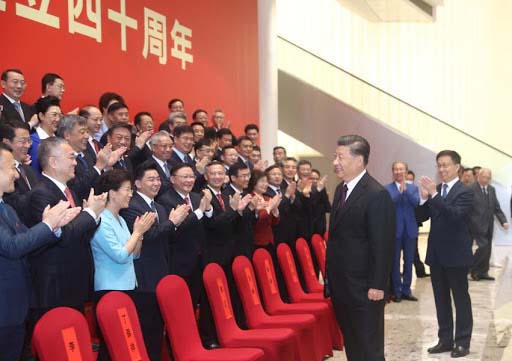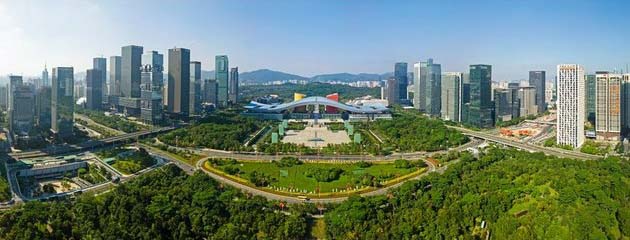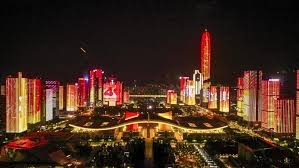Xi Focus: 40 years on, Shenzhen leads China’s new journey toward socialist modernization

Shenzhen: In 1982, Lu Jianxin packed up his things and jumped on a train to Shenzhen, a southern border town designated as China’s first special economic zone (SEZ) only two years earlier.
Receiving a letter from a friend talking about the construction scenes in the SEZ and building a 50-story building, then the tallest in China, as an 18-year-old architecture student, he could not resist the temptation of participating in the grand project and made up his mind to leave then and there.

“Looking back, I didn’t know I would participate in a great cause of building the SEZ and witness a miracle of the age,” said Lu, who has remained in Shenzhen ever since, working as an architectural engineer.
Lu was telling his life story and his connection with the city at a grand gathering held Wednesday to celebrate the 40th anniversary of the establishment of the SEZ in the country’s southern Guangdong Province, a paragon of China’s reform and opening up.
With the efforts of Lu and millions of others drawn to the SEZ in the past four decades, Shenzhen has transformed from a small backward border town into an international metropolis with a permanent population of over 13 million.
The gathering was attended by President Xi Jinping, also general secretary of the Communist Party of China (CPC) Central Committee and chairman of the Central Military Commission.
Hailing Shenzhen’s development over the past 40 years as “a miracle in the world development history,” Xi encouraged China’s SEZs to advance reform and opening up at a higher starting point and make greater contributions to building China into a great modern socialist country.
On Aug. 26, 1980, the Standing Committee of the fifth National People’s Congress, the top legislature, approved the establishment of special economic zones in Shenzhen, Zhuhai, and Shantou in Guangdong Province and Xiamen in Fujian Province.
After 40 years of rapid growth, Shenzhen now ranks fifth among Asian cities in terms of gross domestic product (GDP), which expanded at an annual rate of 20.7 percent to 2.7 trillion yuan (about 400 billion U.S. dollars) in 2019.

The establishment of SEZs is a great innovative move made by the CPC and the country in advancing reform and opening up as well as socialist modernization, Xi said.
As a flagship of China’s high-tech industrial development, Shenzhen boasts a bevy of Chinese startups and tech heavyweights, including Huawei and Tencent. In 2019, the city’s research and development investment accounted for 4.93 percent of local GDP, up from 3.81 percent in 2012.
Xi identified the valuable experience of Shenzhen and other SEZs, including adhering to the Party’s leadership, upholding and improving the system of socialism with Chinese characteristics, adhering to the concept that development is of paramount importance, remaining committed to opening up on all fronts, taking innovation as the primary driving force, following the people-centered philosophy of development, and ensuring scientific legislation, strict law enforcement, judicial impartiality and universal law abiding.
He also highlighted experience such as achieving sustained development of economy and society as well as ecology and environment in a comprehensive and coordinated way, implementing the fundamental principle of “one country, two systems” in a comprehensive and accurate way, and giving full play to the leading and exemplary role of the SEZs while making overall plans for the country.
Building on past success, the CPC Central Committee, in the face of profound changes in international situations, entrusted Shenzhen with new historic missions including leading the country’s drive of socialist modernization.
In his speech, Xi also called on Shenzhen to build itself into a pilot zone for socialism with Chinese characteristics, set an example for cities of a modern socialist country, increase its capabilities to implement the new development philosophy, build a new pattern to deepen all-round reform and expand opening up on all fronts, and contribute to the construction of the Guangdong-Hong Kong-Macao Greater Bay Area to enrich the new practices of the “one country, two systems” cause.
He also welcomed foreign countries to participate more in the reform, opening up and development of China’s special economic zones.
Foreign participation has been indispensable in the building of the special economic zones over the past 40 years, which in turn has also created vast development opportunities and offered development benefits for foreign countries, he said.
Xi’s call came days after China unveiled a plan on implementing pilot reforms in Shenzhen to build the city into a demonstration area of socialism with Chinese characteristics in the next five years.
The city, granted with greater autonomy in the reform of important areas and key links such as carrying out market-based economic reform, improving market and legal environments for global businesses, building a high-level open economy, providing service for people’s livelihood, and bettering the environment and urban space.
He urged the city to unswervingly implement the new development philosophy, achieve higher-quality development by deepening reform on all fronts and expanding all-around opening up.
Xi stressed modernizing Shenzhen’s urban governance system and capacity with innovation, and solving problems in urban governance with the rule-of-law mindset and methods.
Meanwhile, he underlined efforts to address issues in areas including employment, education, medical care, social security, housing, elderly care, food safety, ecology and environment, and public security.
Xi asked Shenzhen to take active moves to further promote the construction of the Guangdong-Hong Kong-Macao Greater Bay Area, calling for efforts to synergize economic rules and mechanisms in the three regions and urging wider exchanges and deeper integration among young people in those regions to strengthen their sense of belonging to the motherland.
“History chose Shenzhen 40 years ago, and Shenzhen created a miracle. Today, the city has been chosen once again, and it must make an even greater difference,” said Wang Weizhong, Party secretary of Shenzhen.





